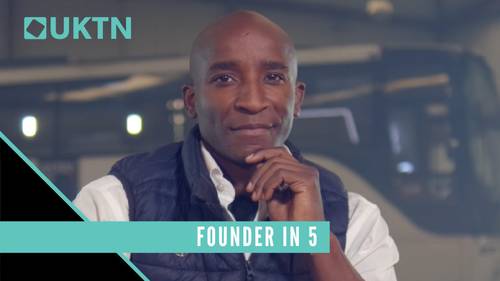William Sachiti is the founder and CEO of the Academy of Robotics, a technology institute developing AI solutions including a fully-autonomous delivery vehicle.
The Norfolk-based company’s other projects include a penguin-shaped robot assistant, which it has trialled in hospitals through a partnership with the NHS, and a computer vision system to detect and analyse faults on roads.
Kar-go, its flagship product, became the first street-legal autonomous delivery on UK roads during a trial in 2020, with its first deliveries transporting medicines from pharmacies to care homes. It has previously been trialled by the Royal Air Force at RAF Brize Norton in Oxfordshire.
Founded in 2017, the Academy of Robotics has raised more than £3m in funding, with the British Business Bank among its notable investors. It has under 40 staff.
Sachiti is a serial entrepreneur and has exited his three previous companies. The most recent was MyCityVenue, which was acquired by Secret Escapes in 2015.
In this week’s Founder in Five Q&A, Sachiti explains why founders should look at the reason someone is investing rather than just how much, why the world would be better without social media and why printers are ripe for disruption.
1. What funding advice would you give to a first-time founder?
William Sachiti: We’re still largely privately funded and you can achieve a lot this way, but you need to know why someone is investing. It’s always one of four reasons: prestige, profit, competition, or a punt – or a sub-category of these.
Why this matters: if you know someone is investing £10,000 to write off a 50% EIS tax benefit, they may not realise that we can actually offer SEIS (a better tax benefit), so I could ask for £30,000 and for them there isn’t much difference. By understanding why someone is investing you can create a better deal for both of you and secure more funding.
2. When should a founder CEO pass the baton on to a new chief executive?
WS: When you find someone who can achieve the same initial goals, but can do it better, faster and scaled out over time has a greater benefit to the company as a whole. My primary duty is to the company and the shareholders. The moment I stop being as efficient as I could be for the organism as a whole, then I need to be replaced. It’s not an emotional decision, it’s simply progress.
3. What’s a fact about yourself that people might find surprising?
WS: Half the reason I’m an entrepreneur and persevere past the point most rational people would quit is that much of my youth was spent with family in rural Zimbabwe. Back then the world was very different: there was no running water, we were herding cattle, and growing vegetables with children in the village.
This wasn’t a fun holiday thing, it was daily life and it taught me some very important lessons. If you mess up in this world, no one will rescue you. There are no social services, benefits or NHS. If you take a risk you have to make it work.
4. Is there a technology that the world would be better without?
WS: Social media – It is slightly concerning that most of the decisions, conclusions and last thoughts before bed and first thoughts after we wake up are heavily influenced – and carefully architected based on our online behaviour – by third parties distantly removed from us.
Social media literally programmes the mind of children to think a certain way, act a certain way and conform to a certain model and you end up having these young people who live in echo chambers. This is a giant experiment which I suspect might end up moving us all backwards.
5. Excluding your own, what’s a sector that’s ripe for disruption?
WS: Printers – we can instantly send information across the globe by touching a piece of glass, but to be able to print, you need to subscribe to some online ink service, have a degree in engineering to pull it apart, change cartridges and constantly buy paper.
The simple act of printing should not be that complicated. The question I use to judge if a technology is optimised for the modern world is ‘if I gave this to my grandmother can she use it without calling me?’ In the case of printers, I feel I need to call someone to help!
Founder in Five – a UKTN Q&A series with the entrepreneurs behind the UK’s innovative tech startups, scaleups and unicorns – is published every Friday.
The post Academy of Robotics founder: ‘If you mess up in this world, no one will rescue you’ – Fi5 appeared first on UKTN | UK Tech News.



